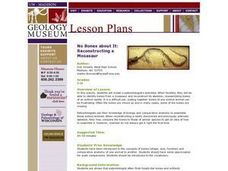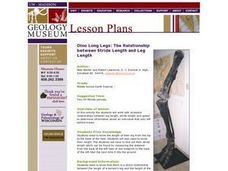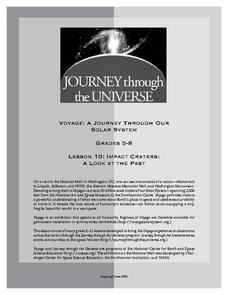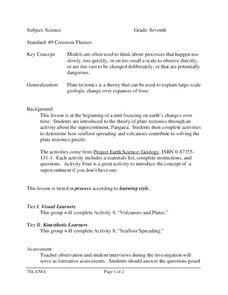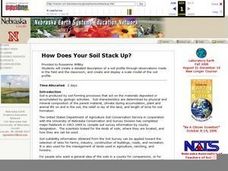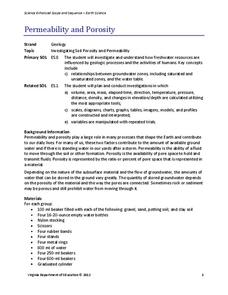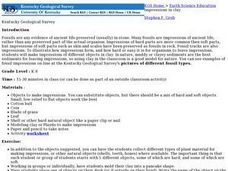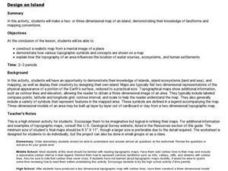Curated OER
Investigating the Biosphere with Planetary Models
Young scholars model the biosphere and manipulate variables affecting change and plan their experiments with the help of others. They describe their question, hypothesis, and methods of investigation.
Curated OER
No bones About It -A Mosasaur
Students model a paleontologist's activities. They identify dinosaur bones and reassemble them into a skeleton of an extinct reptile.
Curated OER
Dino Long Legs
Students calculate the stride length of a walking or running animal. They use scale models of dinosaurs to calculate the leg and stride length of the animals.
Journey Through the Universe
Impact Craters: A Look at the Past
The Galle crater on Mars is also known as the Happy Face crater because of its appearance. First, scholars use pebbles and flour to simulate craters and study their properties. They then apply this knowledge to help decipher the history...
Curated OER
What is the Rock Cycle and Its Processes?
Geology beginners examine three different rock samples and determine their origin by their characteristics. By making and recording observations, they become familiar with features of igneous, metamorphic, and sedimentary rock types....
Curated OER
Earth Forces
Students use geological techniques such as plate tectonics, mountain building, earthquakes, and volcanoes, in order to explain the earth.
Curated OER
Half Life Lab
Seventh graders model radioactive decay using pennies, collect data from their model, apply scientific visualization techniques to their data and create animated models explaining the concept of radioactive half-life.
Curated OER
Earth's History
Seventh graders study the law of superposition by creating models of fossils in layers of rock. They examine how fossils are usually found in sedimentary rock which leads to the study of geologic history in those rocks.
Curated OER
Carving Mountains
Students explore geography by participating in an illustration activity. In this land-form lesson, students define vocabulary terms associated with glaciers and forests. Students utilize pens, cardboard and pottery clay to draw and...
Curated OER
Rock Cycle
Third graders identify various types of landforms of the United States. They discuss earth movements that produce geologic structures and landforms and define cycle as it relates to rocks and soil. They demonstrate the processes forming...
Curated OER
The Fault Line
Pupils use cardboard models of the North American and Pacific plates and sand to investigate what happens when there is an earthquake or movement along the boundaries of the plates.
Curated OER
Science: Draining the Land - the Mississippi River
Young scholars use topographic maps to identify parts of rivers. In addition, they discover gradient and predict changes in the channels caused by variations in water flow. Other activities include sketching a river model with a new...
Curated OER
Science
Seventh graders study the theory of plate tectonics. In this activity lesson students complete an activity to determine how seafloor spreading and volcanoes contribute to solving the plate tectonics puzzle.
Curated OER
A Phylogenetic Perspective for the Cladistically Challenged
Students use M&Ms to simulate radioactive decay of elements.
Curated OER
How Does Your Soil Stack Up?
Students examine the soil in their local area and create a soil profile. They record observations in the field and the classroom. They create their own display of the soil profile as well.
Curated OER
Footprint Detectives: Making Inferences Using Dinosaur Trackways
Students analyze and discuss footprints and dinosaur tracks. They listen to books about paleontologists, create and analyze their own trackways using black paper and chalk, examine the data, and form hypotheses about footprints and...
Curated OER
Edible Four-Layer Earth
This lesson is designed to come after students have studied about the four main layers of the earth. They may relate the size of the sections to known objects such as the mantle to the size of a grapefruit and the outer core to the size...
Virginia Department of Education
Mineral Identification
What's the difference between a rock and a mineral? And what properties are used to identify minerals? The first installment of a five-part series on earth materials and processes prompts young scientists to identify a set of...
Virginia Department of Education
Permeability and Porosity
Covering both permeability and porosity, scholars perform a hands-on experiment testing various soil types. The material includes a pre-lesson worksheet to help focus pupils on the task at hand.
Curated OER
Pangaea Puzzle
Students explore plate tectonics and the formations of the Earth's surface and why maps are distorted. In this Earth's surface lesson students complete a lab and answer questions.
Curated OER
Design an Island
Young scholars explore islands. They create a two- or three-dimensional map of an island. They explain how the topography of an area influences the location of water sources, ecosystems, and human settlements. Lesson includes adaptations...
Curated OER
Giants of the Protozoa
Learners describe and define xenophyophores. In this protozoa lesson students divide into groups and complete a lab activity.
Curated OER
Impressions in Clay
Students examine how fossils are created. They make impressions of different objects in clay and compare them to examples of fossils.
Curated OER
Design an Island
Students make a map of an imaginary island using the topographic symbols provided from a worksheet. Students place lakes, dwellins, reefs, etc. in areas where they would logically be located from understanding how the topography of an...



